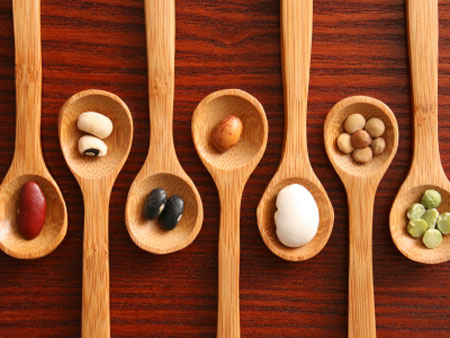
Written By: Beth Ehrensberger, RD
Title: Registered Dietitian
Alumni: University of Tennessee, Knoxville
Last Updated on:

Everyone knows there’s no magical health food. But if you could find a food that could regulate blood sugar, help prevent heart disease and cancer, plus be dieter’s dream, wouldn’t you give it a try? Chances are, you already have – the forgotten can of beans in the back of your pantry is quite the healthy choice. Beans, whether dried, canned, frozen, or fresh provide big health benefits.

Table of Contents
Technically speaking, legume is the inclusive term which refers to beans, peas, and lentils, but often the term “bean” is used to describe the broad category. Unlike other foods, beans have the privilege of belonging to not one, but two sections of MyPyramid – the “meat and bean” and the “vegetable” sections both list beans. If you’re looking to make a vegetarian substitution with beans, keep in mind that 1/4 cup of cooked beans, peas, or lentils is considered equivalent to 1 oz of meat. The protein in beans is about 15 grams per cup – more or less depending on the variety – except soybeans, which pack an impressive 29 grams per cup! Beans can add variety to your menu and break the meat monotony, without skimping on protein.
How can the lowly bean be a powerful soldier in the chronic disease war? Let’s take cholesterol, to start, since the soluble fiber in beans can help improve your cholesterol levels. In particular, a 2001 study found that eating legumes (beans) four times a week, as opposed to only once, was associated with a 22% lower risk of coronary heart disease. If you’re tired of eating oatmeal every day in an effort or lower your cholesterol, try increasing the amount of beans you eat instead.
Think you need fancy, expensive juices and supplements to fill your body with antioxidants? Think again: the number one food on the United States Department of Agriculture’s list of 20 high-antioxidant sources of common foods is a bean. Of those top 20 foods, beans take up four coveted spots. Antioxidants, like those found in beans, have been linked to lowering the risk for some types of cancers, like colorectal.
What’s more, beans, with their soluble fiber and low glycemic index, slow the rise in blood sugar after a meal, making beans a great choice for people with diabetes. Dieters can enjoy that benefit too, since the low glycemic index keeps hunger at bay after eating, and the fiber creates a sense of fullness.
All that fiber helps with digestion and keeps your bowel functions working well. Depending on the bean you choose (most beans have 15 grams of fiber per cup) you can supply a significant portion of your daily fiber needs in one bean-filled meal. Women 19-50 should aim for 25 grams of fiber, and men 19-50, 38 grams of fiber.
You don’t need to shop at a special store or spend a lot of money on fancy health foods to reap great health benefits from beans. Basic beans can supply a load of chronic disease fighting benefits for well under a dollar per serving!
Alumni: University of Tennessee, Knoxville – Beth Sumrell Ehrensberger is a Registered Dietitian and holds a Master Degree in Public Health. An experienced nutrition counselor, writer and public speaker, Beth specializes in translating complex nutrition information into practical concepts. Beth was awarded a Nutrition Communications Fellowship to the National Cancer Institute, and has worked on the internationally recognized Nutrition Action Healthletter of the Center for Science in the Public Interest.
beans, fiber, lentils, protein, soluble fiber, vegetarian